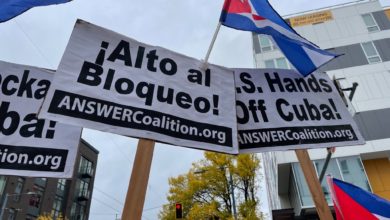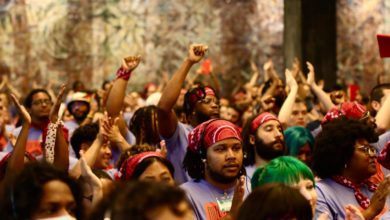Photo: Cuban healthcare workers in Villa Clara
In late July, I traveled to Cuba as part of a delegation of anti-blockade activists delivering medicine. Three days into my trip, I tested positive for COVID-19. During my seven days in quarantine, I experienced Cuba’s deeply compassionate health care system and thorough COVID-19 protocol firsthand.
I got my positive test results while staying in Villa Clara, a province about three hours from Havana. In the United States, COVID patients have to seek out tests on their own, deal with expensive insurance and bills, and find their own transportation to health care facilities. In Cuba, within a few hours of taking a positive rapid test, I was visited by a doctor who gave me a PCR test, checked my symptoms, and completed a detailed account of my whereabouts since my arrival for contract-tracing purposes.
Free, quality health care is guaranteed to all Cuban citizens and even foreigners like myself. In the United States by contrast, seeing a doctor is costly and tests are difficult to access. In New Orleans where I live, PCR tests are almost exclusively available at drive-through pharmacies. After being exposed to COVID-19 in the United States this past February, I walked for 30 minutes to my nearest drive-through PCR test and was refused a test because I was on foot.
For the next five days after testing positive, I was visited daily by doctors who checked my vitals, asked me questions about symptoms, and asked if there was anything I needed. My case was mild, but for someone dealing with more serious COVID symptoms or complications, this thorough and persistent care could make the difference between life and death. In fact, Cuba’s mortality rate rate for positive COVID cases is 0.77%, significantly lower than the 1.1% in the United States – that means that someone who contracts COVID in the United States is about 40 percent more likely to die than someone who gets the disease in Cuba.
Despite my patchy Spanish, doctors, nurses and workers at the Cuban Institute of Friendship with the Peoples, or ICAP, did everything they could to communicate effectively with me. Despite all the difficulties the country is experiencing because of the U.S. blockade, I was provided with three delicious, home-cooked meals per day in addition to tea and bottled water. Several friendly workers at ICAP visited me every day at a distance and with PPE. I was scared to spend isolation in an unfamiliar place, but they consistently made up the best parts of my day.
Quality medical care did not prevent me from feeling isolated and anxious, but everyone providing me with care took my mental health into consideration as well, and did everything they could to cheer me up. One morning when I was feeling down, the ICAP workers invited me to sit at a distance outside with them and chat and have coffee. They took turns sharing stories of their experiences with COVID and told me about their lives, and soon enough my anxiety was replaced by the warm, cheerful feeling of community.
Socialist healthcare saves lives
Cuba’s socialist health care system is able to protect its citizens more effectively than U.S. capitalism’s for-profit counterpart in many areas, leading to lower infant mortality and higher overall life expectancy. Since the 1959 revolution, Cuba has made major strides in improving its population’s wellbeing through massive state investments in health care and biomedical research. While in the United States, over 31 million do not have health care and 1 in 10 adults face medical debt, in Cuba health care is a guaranteed human right. Cuba maintains the world’s highest ratio of doctors to population, and sends doctors around the world to other countries in need. Health care in the United States is run by medical corporations and insurance companies that charge exorbitant prices in the pursuit of profit, but Cuba’s socialized health care is administered by the government with the goal of promoting public health.
Cuba has a community-based, three-tiered health care model that cultivates trust between citizens and providers, while on-the-ground presence in neighborhoods allows prevention and early detection of illnesses. Primary care is administered by family doctors, who keep track of the population through preventative care and basic services in a neighborhood where they themselves live. Every resident of each neighborhood is visited at home by their doctor at no cost to them. Family doctors may refer patients with more serious illnesses to hospitals managed at the provincial level or to nationally-managed specialized hospitals.
These achievements were accomplished in spite of the suffocating blockade the U.S. government has imposed on Cuba for over 60 years. Not only are entities in the United States prohibited from trading with Cuba, any business anywhere in the world that does business with Cuba is banned from the U.S. economy — with only extremely limited exceptions. The weight of the U.S. market — over 200 times as large as Cuba’s — as well as Wall Street’s stranglehold over the vast majority of financial transactions in the world, are leveraged together in a cruel effort to cause unbearable hardships for the entire Cuban population.
The blockade applies to many kinds of medicine too, and the U.S. government refused even a temporary reprieve for the duration of the pandemic. When the virus first hit, Cuba had immense difficulty even getting oxygen to treat COVID patients. This cruel policy must end.
Cuba’s battle against the pandemic
Since the Cuban economy and health care system are centrally planned, the government was able to quickly mobilize resources to serve people’s needs during the pandemic, even while struggling to access tests and personal protective equipment. In the United States, the government is at the mercy of corporate profits, and policy measures focused on getting people back to work rather than keeping them healthy. As a consequence, the United States suffered by far the highest death toll in the world.
In early 2020, Cuba staged a society-wide mobilization against the pandemic — training medical staff, preparing quarantine facilities, and informing its public about symptoms and precautions. When the first cases were confirmed in early March 2020, the government mobilized medical students to check for symptoms at each individual house in the country, and testing and contact-tracing programs took effect immediately.
By March 20, 2020, the government had mandated physical distancing, guaranteed full wages for quarantining workers for the first month of isolation and 60% wages for the duration of pandemic, halted tourism, and expanded food distribution to the most vulnerable neighborhoods in particular. Local neighborhood Committees for the Defense of the Revolution carried out public services like delivering supplies and cleaning and cooking in quarantine centers.
Community-based initiatives like these and a humane policy that took into account the hardships faced by workers facilitated trust. When Cuba launched its own domestically-developed COVID vaccine in July 2021 — a monumental biomedical achievement necessitated by the U.S. blockade — most of the population took the vaccine without hesitation. 90.1% of the Cuban population is fully vaccinated, compared to just 68% in the United States.
Lack of transparency from the U.S. government, hyper-individualistic attitudes created by the ideology of a capitalist society, and hysteria fueled by corporate media contribute to anti-vaccine attitudes in the United States. In contrast, Cuba’s socialist system cultivates a culture of collectivity and social responsibility to one another. Despite the mask mandate being lifted a few months ago, many Cubans continue to wear masks both indoors and outdoors, which is a testament to their willingness to make small sacrifices for collective health.
After seven days in quarantine, I took a negative PCR test and stopped isolating. Thanks to my diligent quarantining and the diligent safety measures in Cuba, no one I was traveling or staying with got COVID from me. I am thankful to everyone who helped take care of me for keeping me healthy and showing me what socialist health care looks like. As someone who lives in the United States and is used to hasty, impersonal doctor’s visits and expensive medical bills, it could not have been more different to receive such quality, attentive health care in Cuba.
Cuba’s tireless commitment to serving its population — and even visitors like me! — is especially impressive given the inhumane blockade imposed by the United States, which prevents access to essential medical supplies and inflicts intense economic hardship on the Cuban people. Efforts like the Hatuey Project — the group I was with delivering over-the-counter medicines — have drawn attention to this particularly cruel component of the economic war being waged on Cuba. The Biden administration must end the suffocating blockade so that Cuba can make even greater strides in serving its people.





